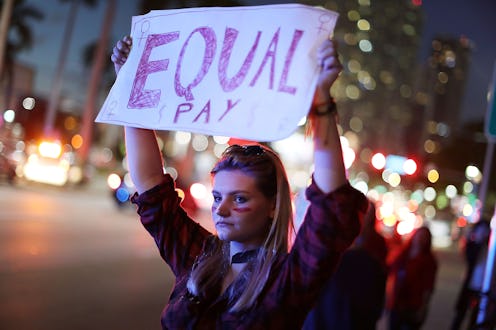News
There Are New Findings About The Gender Gap

For young working women considering having children, Mother's Day this year brought some news: Being a mother isn't the only thing that runs up the wage gap. The bad news? It's a big part of it. The system that rewards men more has been explored in two new studies being published this month. The takeaway from these new studies include that motherhood makes the gender wage gap even more devastating, but there's more to it than that — something you'll want to pay attention to if you're in your late 20s to mid-30s and not having kids.
The New York Times reported over the weekend that "The Gender Pay Gap Is Largely Because of Motherhood," based on two studies that show when the wage gap begins to grow. That's true, but it's not the whole story. The new data suggests is that the wage gap starts comparatively small when men and women leave university, but then grows when women reach their late 20s and mid-30s.
That is the time that some women choose to have children. But many don't, and the studies have some worrying news for childless women of that age too.
The abstract of a working paper published by the National Bureau of Economic Research this month shows that the widening age gap — regardless of income level or education — comes almost completely from the wages of married women. But they didn't necessarily have children. As the other new study, to be published in the American Economic Review this month, put it, the gender wage gape "widens with age, especially in the 15 to 20 years after school leaving. It expands more for those who are married and even more for those with young children."
Even if you're married but not having children, you're still affected. The root cause? Women are expected by their husbands and employers to do more of the work at home and give up opportunities that would adversely affect their husbands' careers. As one of the authors of both studies, Sari Kerr, an economist at Wellesley College, told The Times, "One person focuses on career, and the other one does the lion’s share of the work at home."
That's not good news for the wage gap. The higher earner gets priority — and that's usually a man, creating a sort of vicious circle as soon as women get married that worsens with the added tasks at home associated with having children.
"That reinforces the pay gap in the labor market, and we’re trapped in this self-reinforcing cycle," Kerr explained to The Times.
That's going to need to change: Simply refraining from marriage or having children is not the solution. Women should be able to do either, if they so choose, without sacrificing career opportunities that come with increased wages. If nearly all of the wage gap comes during ages 26 to 33, now is the time to be paying attention and demanding things like paid family leave, for both mothers and fathers, that would truly start to level the playing field.